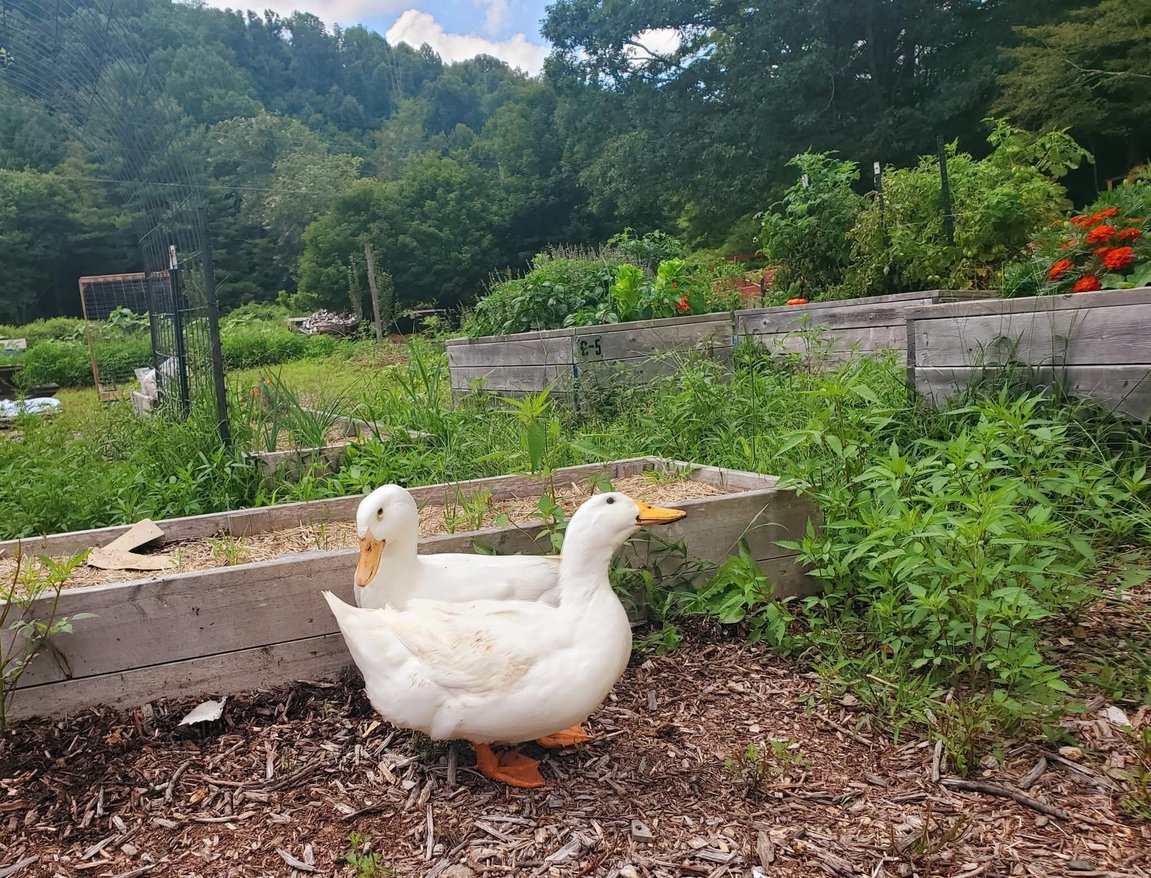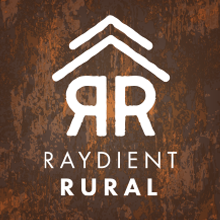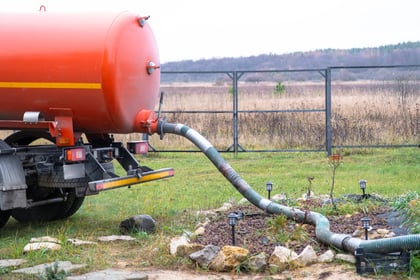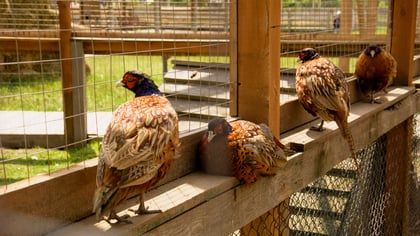How to Raise Ducks on A Hobby Farm: A Beginner’s Guide

Are you thinking about adding ducks to your hobby farm but don’t know where to start? If so, you’ve come to the right place. We spoke with Haley Greene, author Mara Watts' sister and fellow homesteader, to learn all of her tips and tricks.
Haley Greene, a North Carolina homesteader, has always loved animals. So much so, when she became an adult and moved out on her own, she started a hobby farm complete with gardens, fruit trees, dogs, cats, chickens, geese, rabbits and…ducks!
Haley has been homesteading for six years and raising ducks for five. Over the years, she's also raised chickens, geese, goats and rabbits. With more than a decade of gardening experience (and a serious green thumb), Haley grows an abundant garden each year.
Purchasing duck eggs at the store or from a fellow homesteader is more expensive than chicken eggs, and can be difficult to find. Having them readily available is a perk of raising your own flock.
“Duck eggs are great for baking because of their rich content,” says Haley. “They’re healthier than chicken eggs because they have more antioxidants, omega fatty acids and more vitamins like A, B12 and a higher content of minerals like iron and selenium. Because they’re so rich, duck eggs are so much tastier than chicken eggs.”
But ducks aren’t just useful as egg layers. They can also provide a source of meat, their manure can be used in the garden and many breeds make wonderful pets.
In this article, we talk with Haley to share everything you need to know about getting started raising ducks.
- How to Choose the Right Ducks
- How Many Ducks Should You Get
- How to Care for Ducklings
- How to Create the Best Shelter and Space
- How to Protect Your Ducks from Predators
- What Do Ducks Eat and Feeding Tips
- How to Keep Your Ducks Healthy and Clean
- Common Duck Health Issues to Watch For
- How to Tell Your Ducks are Happy and Thriving
- Additional FAQs on Raising Ducks

How to Choose the Right Ducks for Your Hobby Farm
Before you bring ducks to your hobby farm, it’s important to know what your plan will be: are you raising ducks as pets, for their eggs or as a meat source?
Also, what noise level are you willing or able to accommodate? Some ducks, like Pekins, are extremely vocal, while Muscovys are generally quiet.
Knowing this bit of information will help guide you in selecting the breed best suited for your homestead.
Different Duck Breeds Recommended for Hobby Farms
Muscovy Duck
The Muscovy duck is a quiet, friendly breed, making it a great choice for beginners. They are intelligent, can fly and enjoy free-ranging and foraging.
Muscovys are a larger breed, typically weighing between 9-15 pounds at maturity. While they are not good egg layers, averaging only 100 eggs per year, they are well-suited as meat birds.
“Our Muscovys were free-range and would fly up in trees at night to sleep,” says Haley. “They prefer being high rather than on the ground. They have good instincts. It was always interesting to watch.”
Tip: Muscovys are a tropical breed and are prone to frostbite. This type of duck is best suited for warmer climates, but can thrive in cold climates with extra support from their caretakers.
Khaki Campbell Duck
After some time, Haley ended up selling her Muscovys after adopting a few Khaki Campbell ducklings.
“They eat less and lay more eggs,” she says. “They are much more cost-effective than the Muscovys.”
The Khaki Campbell breed is known for being excellent layers, producing anywhere from 250 to 300 eggs a year. The only downside to this breed is it is often nervous and skittish, so don’t expect to cuddle up with them.
Pekin Duck
Pekins are a popular and well-known breed for homesteading. They are friendly and great egg layers, averaging between 150 to 200 eggs per year.
They do come with a few disadvantages, however. Pekins can grow quite large, especially the jumbos, tend to be noisy and may experience health issues due to their rapid growth and heavy weights.
To keep them from becoming obese, plan to feed Pekins on a strict and healthy diet.
Other duck breeds to consider include:
- Cayuga
- Welsh Harlequin
- Indian Runners
- Blue Swedish
How Many Ducks Should You Get for Your Hobby Farm?
Ducks are social animals and can become lonely without other duck friends around. When starting out, plan to adopt at least two to four ducklings to ensure they’ll be happy.
Also, consider your female-to-male ratio. It’s best to have one male to four females. This will help protect the females from over-mating or becoming injured.
How to Care for Ducklings
If you’re planning to raise ducklings, there are a few things to consider.
Setting Up a Brooder for Ducklings
Ducklings need to live indoors in a brooder during their first weeks of life. A brooder is a safe, enclosed space designed to keep ducklings warm, dry and protected until they’re fully feathered and ready for the outdoors.
A brooder setup should include:
- A large plastic waterer or container filled with pine shavings for bedding
- A feeder and waterer
- A heat lamp to keep them warm

Food and Water Essentials for Ducklings
Always provide plenty of food and water. Water is especially important for ducklings as they need it to clean off their bills and nostrils.
Preventing and Treating Pasty Butt in Ducklings
Check ducklings regularly for “pasty butt”, a condition where the vent hole becomes clogged by dried stool. If this happens, soak their bottom in warm water and gently rub it off.
When Can Ducklings Move Outdoors?
Once ducklings are fully feathered — usually around 8 to 9 weeks old — they can safely move outdoors to a shelter or coop designed for their needs.
Duck House Ideas for Creating the Best Shelter and Space
To keep your ducks safe and comfortable, a well-built shelter and run are necessary.
Duck Coop and Space Requirements
Plan to provide a minimum of 16 square feet of roaming area and 4 square feet of floor space in a shelter per duck.
Tips for Building an Easy-to-Clean Duck House
“Ducks are messy little creatures,” says Haley, so she recommends setting up a run designed for easy cleanup.
1. Consider gravel instead of dirt floors
Instead of a dirt floor, for example, some homesteaders lay gravel and allow their ducks out on grass only when supervised.
2. Invest in a well-designed shelter and swim area
“You don’t want their residence to smell and attract flies. Be prepared to spend some money getting their shelter and run set up. And spend a little extra on their swimming area. You want it to be easy for the ducks to access, but also easy to clean regularly.”
3. Keep the swimming and feeding areas separate
For Haley, keeping her ducks’ swimming pool separate from their shelter is helpful:
“I tend to keep their pool for swimming in one area, and their feed and drinking water in another area. You’ll find that their drinking water tends to need to be drained and refilled more often than the pool water does. They’ll dabble their food in water and make it really messy.”

Should You Free-Range Ducks?
Free-ranging is another option if predators are not a concern or if a guard dog resides on the property to help deter them. Otherwise, a covered and enclosed space is ideal.
How to Protect Your Ducks from Predators
Speaking of predators, ducks, especially ducklings, are particularly vulnerable prey. Their slow waddle and (often) inability to fly make them susceptible to animals like raccoons, hawks, snakes, weasels and coyotes, just to name a few.
Predator-Proofing Your Duck Shelter and Run
Your best defense against predators is to provide your ducks with a good, solid structure for their home and to install an automatic door.
“Most ducks won’t go up on their own like chickens do, so you will probably have to herd them in their shelter at night,” says Haley. “An automatic door comes in handy, especially in the early morning hours. That way if you want to sleep in a little bit, you don’t have to worry about letting them out.”
Additional Ways to Keep Ducks Safe
1. Use chicken wire or bird netting for overhead protection
Another tip is to keep their area covered with chicken wire or strong bird netting. This will keep your ducks safe from aerial predators like hawks and owls.
2. Reinforce the base of the run to block diggers
Adding rocks, cinder blocks or something heavy at the base of the run prevents ground predators from digging in. Haley also recommends burying part of the run and keeping an eye on the perimeter for possible digging locations.
3. Consider a guard dog to deter predators
“I also recommend getting a farm dog. We have an Australian Shepherd that helps keep our free ranging animals safe. When he’s not outside, we put the chickens and ducks up in their pens.”
Related reading: How to Choose the Best Livestock Guard Dog Breed For Your Farm
What Do Ducks Eat: Feeding Tips for a Healthy Flock
Ducks have unique dietary requirements. They tend to eat more than chickens and require additional niacin, or vitamin B3, to support their growth and bone development.
Daily Duck Diet Essentials
“We buy duck feed from our local feed store,” explains Haley. “Purina brand is a good choice, and add Brewer’s Yeast for extra niacin. We give them mealworms and other dried bugs as treats, and they love dandelion leaves, lettuce, herbs and most greens.”
When temperatures are warm, ducks enjoy foraging for food and will eat bugs, snails and slugs – “The things you don’t want in your garden,” Haley chuckles.
For a well-rounded diet, you should feed your ducks the following daily:
- Dry duck feed
- Brewer’s Yeast – add about 1 to 2 tablespoons to each cup of feed
“It’s not a fun time, but they need water and rely heavily on their humans,” she stresses.
Healthy Treats for Ducks
In addition to their daily diet, ducks benefit from healthy treats that provide variety and extra nutrition. These snacks can encourage foraging behavior, support digestion and keep your flock engaged.
Ducks enjoy treats, such as:
- Fermented duck feed*
- Cracked corn, rolled oats and birdseed
- Vegetables such as greens, frozen peas and vegetable skins chopped into bite size pieces
- Fruits (in moderation, and no citrus!) such as grapes cut into small pieces
- Dried bugs and worms
*To ferment, soak the duck feed in water for a few nights. According to Haley, this significantly cuts down on feed costs and is said to be healthier for your flock. Fermenting duck feed increases its nutrient availability, ultimately improving digestion and gut health.
Foods to Avoid Feeding Ducks
Many people think you can feed ducks bread, but this is a common misconception. Bread can actually harm your ducks by filling them up without providing the necessary nutrients, which can lead to various health problems.
Foods to avoid feeding to ducks include:
- Bread, chips,and crackers as they lack nutritional value and may harm your ducks
- Sweet and sugary foods
- Moldy foods
- Foods considered toxic for ducks include raw beans, white potatoes, onions and avocado

Keeping Your Ducks Healthy & Clean on the Homestead
Ensuring ducks on the hobby farm stay clean and healthy can be quite the chore – especially when they love water and mud. But according to Haley, ducks tend to keep themselves clean if they are provided with clean water to bathe and splash around in.
“As long as they’re not overweight or have lethargic symptoms from an illness, ducks will preen their feathers to keep themselves healthy externally,” she explains. “We also give our ducks apple cider vinegar in their water. I believe that helps keep them healthy.”
Cleanliness plays a major role in keeping ducks healthy on the hobby farm.
Common Duck Health Issues to Watch For
It’s also important to watch for common health issues that can affect them. A few to keep an eye out for include:
Bumblefoot: What It Is, Causes and Prevention
Bumblefoot is a painful bacterial infection that occurs after a duck gets a cut or scrape on its foot. Bacteria enters the wound, causing swelling and hard lumpy scabs to appear.
To treat bumblefoot*, clean the wound and soak the foot in warm water and Epsom salts. Apply an antibiotic ointment and wrap the wound to keep it dry and clean. In severe cases, or if in doubt, always consult your local veterinarian.
To prevent it, Haley suggests keeping their living area clean and removing any sharp objects that they could step on. This will help keep their webbed feet in good condition.
Angel Wing: What It Is, Causes and Prevention
Too much protein in a duck’s diet can cause a condition known as “angel wing” – a mostly cosmetic issue where the last joint of the wing twists outward. Although it doesn’t affect their quality of life or cause any pain, angel wing can affect the bird’s ability to fly.
Usually, this condition is caused by poor diet and rapid growth in ducklings. If caught early, the diet can be modified and the wing wrapped to help the joint grow back in its proper place.
“Angel wing doesn’t seem to negatively affect the ducks we’ve raised,” says Haley. “But when it comes to keeping a breeding stock or selling them to other homesteaders, it doesn’t look pretty and may deter buyers.”
Egg Binding: What It Is, Causes and Prevention
Egg binding is a common issue in egg layers. It’s a serious, and potentially fatal, condition where a female duck is unable to lay an egg because it is stuck inside of her.
Often triggered by stress, lack of calcium, poor diet, obesity and/or dehydration, egg binding can cause damage to the bird’s internal organs and reproductive tract, resulting in excruciating pain.
If you suspect a duck is egg-bound, it’s important to seek professional veterinarian assistance immediately. In the meantime, offer calcium, water, and give her a warm water bath to help relax the muscles.
To prevent egg binding, always provide proper nutrition, including calcium and water and maintain a stress-free, relaxing environment.
*Note: This article is for informational purposes only and is not a substitute for professional veterinary advice, diagnosis or treatment. Always consult a qualified veterinarian if you have any concerns about your duck’s health or behavior.

How to Tell Your Ducks are Happy and Thriving
You’ll know your ducks are happy and thriving by the behaviors they display.
“If they’re preening or grooming their feathers, shaking their bodies and flapping their wings, dabbling, eating, swimming and resting in the shade or sun with their heads tucked in their feathers – these are signs they are happy. And, if they wag their tail like a dog, it means they’re happy and excited to see you,” Haley concluded.
How To Get Started Raising Ducks FAQs
We’ve covered a lot about how to get started raising ducks, but there are always more details. Here we answer some FAQs.
Q: Do Ducks Need A Pond?
A: No, ducks don't need a pond, but they do need access to some water source that is deep enough for them to dunk their heads and bills into.
Ducks use water to clean their bills and for preening, which helps keep their feathers clean and in good condition.
Water is also important for keeping ducks happy and healthy.
Ducks love to swim, so providing them with a water source that is deep enough for swimming will offer them the enrichment and fun they desire. Although swimming isn't an absolute "must."
Ponds are great, but if you don't have one or space is limited, you can offer them any of the following:
- Plastic kiddie pool (like the blue ones), just be sure to clean it regularly
- Old bathtubs
- Stock tanks
- Large buckets - if space is limited, you can provide ducks with a large bucket of water so long as the bucket is deep enough for the ducks to fully submerge their bills and heads
Q: Can You Raise Chickens and Ducks Together?
A: Yes, ducks and chickens can be kept together.
However, there are a few things to consider:
- Ducks need access to water, so plan to add a large water source to the coop or run
- Male chickens and ducks can become aggressive (especially ducks) toward each other. Keep an eye on them and separate if needed
- Ducks and chickens can eat the same types of feed, but ducks will need niacin added to their diet
- Chickens roost and need nesting boxes for laying eggs. Ducks, on the other hand, roost and lay eggs on the ground.
Says Hayley, “Says Hayley, "You can raise them together, but during spring mating time, they should be separated if there are any males. They really need separate living spaces, though."
Q: When Do Ducks Start Laying Eggs?
A: Ducks typically start laying eggs between 5 and 8 months of age, but this can vary between species and season.
For example, ducks tend to lay more eggs when it’s warmer out versus in the middle of winter.
A quick search of your breed will tell you a more specific age range.











Your email address will not be published. Required fields are marked*